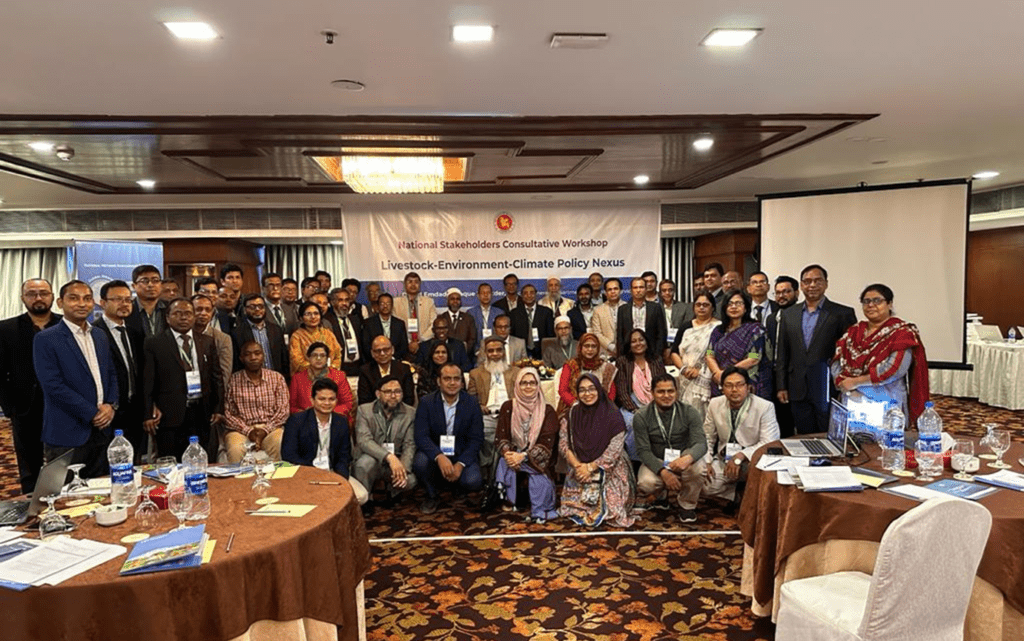The Food and Agriculture Organization of the United Nations (FAO), in collaboration with the Department of Livestock Services (DLS) under the Ministry of Fisheries and Livestock, organized a two-day workshop from 10 to 11 December 2023 in Dhaka. The workshop on Livestock-Environment-Climate Policy Nexus brought together about 70 participants from 33 organizations, including the public and private sectors, farmer organizations, development agencies, and non-government organizations (NGOs). During the workshop, participants examined gaps in policy measures that need to be addressed to enable the country to upscale the implementation of the proposed greenhouse gas emissions reduction initiatives, in particular methane, within the livestock sector and thereby achieve the targets under the nationally determined contributions (NDC) for the period 2021 to 2025 to the Paris Agreement.
About the workshop
The workshop was part of the FAO Flexible Voluntary Contributions (FVC) subprogramme on “Scaling-up climate actions to enhance Nationally Determined Contributions and climate and livestock”. The initiative builds synergies with the ongoing Livestock and Dairy Development Project (LDDP) funded by the World Bank and implemented by DLS with technical assistance from FAO. The project aims at improving productivity, market access, and climate resilience. The FVC Subprogramme supports the development of standard methodology for greenhouse gas (GHG) inventory, screening of the most promising technologies for methane reduction in the livestock sector and development of training manuals for the adoption of mitigation technologies from feed and manure management practices.
Background
Bangladesh has committed in its NDC to enhance climate resilience and mitigation interventions from the agriculture sector, including livestock. Livestock climate actions will involve improving breeds, feed production and manure management systems. Thus, Bangladesh is a signatory to the Global Methane Pledge, a non-binding initiative to reduce methane emissions by 30 percent by 2030 relative to 2020 levels. FAO, in collaboration with the Ministry of Fisheries and Livestock, developed a robust methodology to estimate GHG emissions along livestock value chains. This workshop followed the previous national hands-on training of trainers on GHG emissions inventory and livestock climate actions conducted from 1st -2nd November 2023 in Dhaka.
Key recommendations
During the workshop, participants recognized several challenges and barriers to the effectiveness of the proposed methane reduction actions that may undermine the successful implementation of the NDC. The challenges exist not only within the livestock sector but also in all other relevant sectors in the country. Furthermore, the stakeholders formulated key recommendations to address these challenges and barriers as follows:
- Establish and strengthen institutional arrangements for coordinating methane reduction efforts, with leadership commitments from the government and meaningful participation of international partners, NGOs, the private sector, research, and universities. It was proposed that each public institution should establish a dedicated climate unit.
- Increase awareness and build capacity on methane emissions, their drivers, effects, measurement, and mitigation technologies. Address concerns about limited understanding, low priority, and fragmented technologies, and improve access to climate finance instruments.
- Create sectoral innovation hubs and clearinghouses to develop standardized methodologies for measuring and reporting emissions and test the cost-effectiveness of technologies for methane reduction.
- Strengthen the collaboration between Government and development agencies to enhance research and extension through field-based demonstrations of technologies, piloting the quantification of emissions, and promoting best practices to inform livestock climate actions. Research is needed to explore mitigation co-benefits from increased productivity, adaptation and economic-diversification actions, enhance resilience and link NDC and Bangladesh’s National Adaptation Plan (NAP).
- Develop a road map to tackle the challenges that undermine the country’s efforts to reduce methane emissions to achieve the commitments of the NDC and upscale the piloted methodology for greenhouse gas emissions estimation and screening of priority technologies and capacity building of smallholder farmers on sustainable management of methane emissions from enteric and manure sources.
Way forward
During the workshop’s closing ceremony, the Director General of DLS expressed the commitment to provide leadership and support initiatives to tackle methane emissions in the livestock sector. This will be undertaken in collaboration with other stakeholders including domestic and international development partners. In early 2024, FAO will organize additional multistakeholder planning sessions to finalize the collaborative action plan to operationalize the National Methane Framework and strategies for sustainable methane management.

